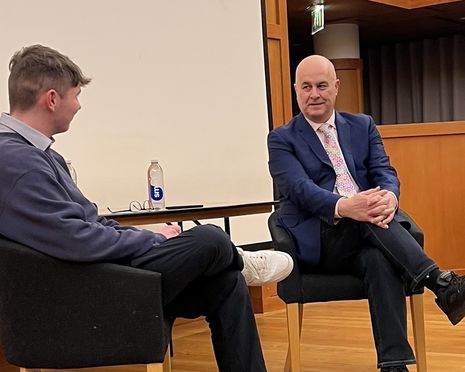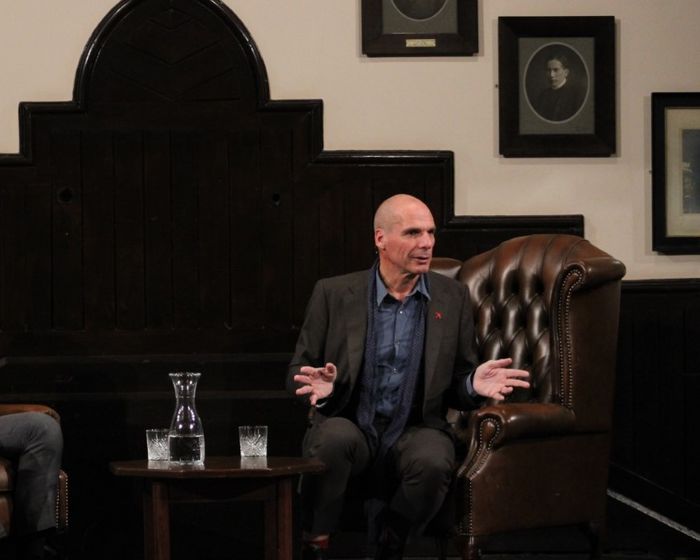Political broadcaster Iain Dale: ‘political parties don’t play ball’
Iain Dale shares his thoughts on Ukraine, the hard left, and the responsibility that comes with having a platform

Iain Dale is one of the UK’s leading political broadcasters, building his name in party politics and blogging. In 2005, Dale became the first openly gay Conservative candidate to stand for a general election and won the Guardian Political blog of the year award for the ‘Dale Diaries’. While unsuccessful in his first election, in 2009 Dale ran for selection for the Conservative safe seat Bracknell but came third in the runoff behind Rory Stewart and winner Philip Lee. In 2010, in a blog post, Dale announced his retirement, both from blogging and party politics.
Since this early political disappointment, Dale has become one of the defining right-wing voices in British broadcasting. I was fortunate enough to interview Dale after he spoke at the Trinity Politics Society. During his talk, Dale described the strange role of a broadcaster, how you become “the friend they’ve never met” to people across the country, and the parasocial relationship that forms when, three times a week, you live in someone’s ears. Whilst he acknowledged the responsibility his platform came with, he focused on the positive side of his audience. Any programme which gives a voice to people all over Britain, he argued, was an important vehicle for empathy. From his own experience, he discussed a phone-in he hosted with people who had entered Britain illegally. Despite initially holding strong views about illegal immigration, he found his perspective softened as he heard, first-hand, the real stories and hardships of those who feel they have to enter the UK illegally.
“History is going to judge [Obama and Merkel] differently”
In his talk, he argued for greater empathy in politics and its importance in creating good-faith political discourse. With this in mind, I begin our interview by asking him how he is able to balance the discussion and give equal oxygen to differing views on his debate programme Cross Question. While Dale says that it is important to construct the panel in such a way as to avoid any one party launching an “aggressive missive” at another, he argues that the largest issue is with clarity of communication. Often “political parties don’t play ball,” and “the conservative party in particular” regularly fail to provide people who can adequately present their message. I understand from this that it is impossible to engage in a good-faith debate if neither party clearly expresses their position.
Following on from this, I want to get Dales’ clear perspective on one of the most widely discussed issues of our time: Putin and the war in Ukraine. A few days before we spoke, Dale had been invited to a conference by the Pilecki Institute. On the final day of the conference, during a discussion on the war in Ukraine and its influence on Europe, Dale says when it comes to appeasement “Obama and Merkel, who liberal Europe love… history is going to judge them differently.” I ask Dale to expand on these comments and respond to Andreas Kluth’s provocative headline ‘Merkel will enter history as the Neville Chamberlain of our times.’ While Dale believes Kluth’s statement to be “an exaggeration” he argues that the longer time goes on, the more critically people are going to view both her and Obama’s time in office. Dale implies that Merkel’s passivity when faced with Putin’s aggression makes her responsible for the current crisis in Europe, but does not consider her solely responsible. Instead, he sees her as simply part of a “collective western thing”: a chain of events which begins with George W Bush and Tony Blair’s attempts to bring Putin into international norms (an attempt, Dale argues, which “was quite clearly never going to work”) and the West’s lack of response to Russia’s invasion of Jordan.
Regardless of what led to the conflict and who should take responsibility, the current reality is the war in Ukraine. I ask Dale, putting aside the past, what Britain’s current role is in supporting Ukraine. Ultimately, “our role is to encourage France and Germany to do the right thing” and match Britain’s aid. In this role, Dale believes we have already been somewhat successful.
To conclude, I ask Dale to respond to one of the few contrary voices that has appeared around Ukraine, that of Jeremy Corbyn’s during his interview with LBC’s ‘The News Agents’. During this interview, Corbyn stated that he “would not be sending materiel [to Ukraine] which would allow the invasion of Russia.” At this, Dale scoffs and calls Corbyn’s claim “preposterous” but goes further saying that this view is symptomatic of the hard left’s desire to “always find some excuse for Russia’s actions,” unlike the broad-left who are “united with everyone else.”
On this characteristically decisive note, we end our interview. After meeting Iain Dale, I completely understood why he is one of the most popular and influential political commentators in Britain today. A clear and passionate communicator, whether on the topic of Ukraine, the “hard left” or the power of broadcasting, he expresses himself with clarity and consistency — Dale is an important voice in Britain today.
 News / Cambridge academics sign open letter criticising research funding changes22 February 2026
News / Cambridge academics sign open letter criticising research funding changes22 February 2026 News / Supporters protest potential vet school closure22 February 2026
News / Supporters protest potential vet school closure22 February 2026 News / University Council rescinds University Centre membership20 February 2026
News / University Council rescinds University Centre membership20 February 2026 News / Hundreds of Cambridge academics demand vote on fate of vet course20 February 2026
News / Hundreds of Cambridge academics demand vote on fate of vet course20 February 2026 News / Union cancels event with Sri Lankan politician after Tamil societies express ‘profound outrage’20 February 2026
News / Union cancels event with Sri Lankan politician after Tamil societies express ‘profound outrage’20 February 2026










